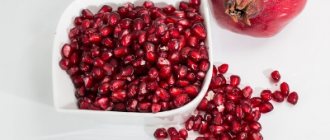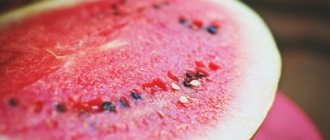When getting a dog, responsible owners ask themselves the question: how to properly structure its diet? It is no secret that both the health and longevity of an animal depend on proper nutrition.
To do this, the dog must receive all the necessary vitamins and microelements. In humans, the concept of “healthy, proper nutrition” is not complete without fruits. But whether dogs need fruit is a big question. We will discuss the answer to this in the article.
List of useful
Fruits should occupy a small part of the diet. They do not need to be given every day and not all of them. The following will be beneficial for your dog:
Apples
In our latitudes, this is the most common and appropriate treat for your pet. They contain vitamins A and C and are a valuable source of fiber. Good for digestion. At the same time, the content of proteins and fats in the fruit is low, so it can be treated to older dogs without fear.
Another advantage of apples is that they rarely cause allergies. And thanks to the large number of varieties, you can choose exactly the taste that your pet likes: sweet, sour, sweet and sour.
Pears
Not very sweet and ripe fruits are useful. Another inexpensive, like an apple, and healthy fruit. It is characterized by a high content of fiber, vitamins C and K, and the microelement copper.
Veterinarians say that regular consumption of pears reduces the risk of a heart attack in an animal by about half. They also rarely cause allergies, and dogs usually enjoy crunching on pears. Almost like a bone, only sweet!
Plums
Unlike apples and pears, they should be given with caution: overripe plums cause stomach and mental upsets in dogs (due to the alkaloids they contain). But a small amount of unripe seedless fruits will help diversify your diet.
Papaya
An exotic fruit that is difficult to imagine in a dog’s diet. But in vain: it is very useful. Papaya has the property of improving digestion and eliminating problems with the gastrointestinal tract. In veterinary pharmacies you can find tablets with papaya extract.
Important : when feeding this fruit, you must take precautions!
- Choose ripe fruits without any foreign smell or waxy coating. It is worth making sure that the papaya has passed a health inspection.
- You can feed your pet small, peeled pieces. In large quantities, the fruit can cause an increase in blood sugar and cause constipation.
Watermelons
In the summer, this huge berry will perfectly complement the drinker: it contains up to 92% water. There are also vitamins A, C, B and B-6, potassium. If the watermelon is homemade, guaranteed without nitrates, then it can be given with rinds (but without seeds).
Bananas
They are a stumbling block: some dog breeders claim that bananas are not allowed for animals, while others freely feed them to both adults and puppies.
Bananas are high in potassium, copper, fiber and vitamins, so they can be given periodically. But not in large quantities and unripe: the abundance of sugar makes a banana a harmful, but welcome treat for a dog.
Melon
A safe, but absolutely devoid of nutrients, treat. Melon is a great way to quench thirst in the summer, and to make it more healthy, you can mix the melon pulp with a spoonful of honey (if the dog is not allergic to it). In large quantities it can cause a laxative effect.
Persimmon
There are enough useful elements in persimmon (vitamins C, PP, E, A and trace elements: calcium, potassium, iron, phosphorus, manganese, magnesium, iodine, copper), and all dogs without exception like it.
But don’t get carried away: it causes stomach upset. This property can also be used for benefit by feeding persimmon to your pet if there are problems with stool.
We recommend that you read separate articles about mango and pineapple for dogs.
Can a Yorkshire Terrier eat berries?
In a previously prepared article regarding Yorkie nutrition, we looked at the aspect dedicated to fruits: which ones can and cannot be given. There we mentioned some berries and briefly outlined our recommendations in this regard. Now it’s time for a full review of the most popular berries. In this article, the owners of our beloved dog breed will find out whether it is possible to give their Yorkie berries. If yes, which ones and how many.
On numerous forums and from the words of dog owners, with the arrival of summer, you can find questions regarding the presence of berries in the diet of Yorkshire terriers. Unfortunately, many people believe that there is nothing harmful if a pet accidentally or even on purpose eats several berries from a bush on its own. Some owners purposefully feed a handful of fresh “beads” to the dog, not seeing anything prejudiced in this and believing that the extra vitamins will not harm. In reality, everything is not so simple.
What danger can berries pose for a Yorkie?
It is important to remember that many berries are “allergenic,” meaning they can cause an allergic reaction. This especially applies to the so-called “red” berries (strawberries, raspberries, red currants). We must not forget about restrictions. You should not feed any dog, including the Yorkshire Terrier, berries. We can only talk about one or two berries. Be sure to thoroughly wash them (and not hastily rub them on your clothes), and even better, sterilize them. The berries contain many trace elements that can disrupt a dog's metabolism. Especially the Yorkie's delicate digestive system. The glucose content in berries is quite high. Exceeding it will not benefit the pet. The gastrointestinal tract cannot cope with large amounts of plant fiber.
Can a Yorkie have strawberries, wild strawberries, and raspberries?
The listed “red” berries contain plenty of plant fiber and microelements that can cause an allergic reaction. If in a large dog it can be caused in the case of strawberries after eating many berries, then in a Yorkie it is already from the second or third berry. Strawberries, raspberries and strawberries are full of vitamins and antioxidants. Raspberries are less useful due to the content of rather large seeds. In addition, raspberries are the largest allergen of the three listed berries. Therefore, it is better not to give it to your Yorkie at all. Particular attention should be paid to the remains of twigs and leaves.
Can a Yorkie have gooseberries?
Gooseberries contain a large amount of vitamin C, which should be sufficient for a balanced dog diet. Therefore, eating even a few large berries can cause an imbalance of microflora in the gastrointestinal tract and cause vomiting. With regard to this berry, everything is purely individual. Try giving one berry to your Yorkshire Terrier and observe its condition. If there is a gooseberry bush growing in the garden bed, and you notice that your pet has begun to pick the berries on its own, you need to remove the berries from the lower branches or trim them.
Can a Yorkie have currants (red, black)?
Yorkshire terriers are more willing to consume ripe blackcurrants than red ones. The second one is more sour. To add more sweetness, you can grind it together with black or other sweeter fruits that can be given to your Yorkie, but under no circumstances add sugar. You shouldn't overdo it. Many zoological nutritionists and veterinarians confirm that both red and black currants contain a little-studied toxin that can have harmful effects.
Can a Yorkie have blueberries, blackberries, blueberries?
It is best to give all three of these berries to your dog in small quantities in dried form. Fresh - not recommended. In its fresh form (skin and seeds) there is quite a lot of acid, which can cause a laxative effect. Quite strong allergens. Especially blackberries. There are practically no benefits from these berries, but there are plenty of potential dangers. It can be given in small quantities only to a dog that does not have a tendency to allergic reactions. Dried blueberries are used by some veterinarians as an astringent against diarrhea. Oddly enough, this berry has the opposite effect when dried. Dried blueberries, blackberries and blueberries are used in the treatment of vitamin C deficiency.
Can a Yorkie have lingonberries and cranberries?
Lingonberries contain a high content of vitamin C. There is also a lot of provitamin A. As in the case of previous berries, dried lingonberries are used in the treatment of gastritis, other diseases of the gastrointestinal tract, diarrhea, and vitamin deficiency C. All the same recommendations apply to cranberries. The berry can be used to treat the urinary tract.
Final recommendations regarding berries and Yorkie
It is possible to give your Yorkshire Terrier some raw berries, but there are certain restrictions:
- Berries should be given raw only in exceptional cases;
- in extremely limited quantities;
- after the Yorkshire Terrier has eaten several berries, be sure to monitor the dog’s condition;
- for a significant part of the berries, the effective recommendation is their dried form;
- For those owners who really want to include berries in their Yorkie's diet, it is better to start with a special food that contains these ingredients.
Follow a few simple recommendations listed, and your Yorkshire Terrier will be fine. You can familiarize yourself with other useful materials regarding the proper nutrition of your Yorkie in the profile section of the site at the following link.
Which ones are not allowed?
You need to give your pet any unusual fruit carefully, a little at a time, so that if something happens, you can immediately identify and stop an allergic reaction. But there are a number of fruits that are definitely prohibited: they cause eating disorders, allergies, and irritate the mucous membranes.
Important : even if dog owners write on forums that their animal “eats it without any problems,” you should not experiment with your pet’s health. A particular example only shows that someone got a dog with excellent health, or the animal’s problems went unnoticed.
Forbidden fruits include:
- Citruses. Strong allergen, irritates mucous membranes. Most often, after eating citrus fruits (tangerines, oranges, etc.), dogs begin to vomit and suffer from diarrhea.
- Pomegranate . For humans, this fruit is considered healthy, but for dogs it will only cause stomach problems: it is too sour. Bones cause digestive problems and can be toxic to small breeds.
- Peaches. They also cause diarrhea, lead to the accumulation of cyanide in the body, and their seeds can be deadly poisonous.
- Quince. Toxic to dogs: causes profuse vomiting and swallowing problems. It is also very sour - and not every person will agree to eat it.
- Avocado. Contains a substance that has a “stunning” effect for animals. It simultaneously provokes vomiting, diarrhea, breathing and heart problems, and pancreatitis.
Important : jam, even from permitted fruits, is contraindicated for dogs - due to the high sugar content and lack of benefit.
Harmful fruits for dogs
Although some fruits in small portions may be healthy for your dog (unless your dog has allergies), never offer him the fruits listed below. If your dog accidentally eats them, contact your veterinarian.
1. Grapes and raisins: are the cause of many cases of poisoning when ingested.
2. Avocado: May cause gastrointestinal distress.
3. Figs: Causes an allergic reaction in some dogs. In addition, figs grow on a fig tree of the ficus family (Ficus benjamina), which causes inflammation of the dog's skin if it comes into contact with it. Ficus plants or trees also cause diarrhea and vomiting if your dog eats any parts of them.
4. Orange Tree: Toxic to dogs, cats and horses due to psoralens and essential oils. Your pet should not swallow seeds, peels, leaves or stems of the tree or fruit. Symptoms of orange tree poisoning include depression, diarrhea and vomiting.
5. Lemon tree: is toxic to dogs, cats and horses due to its psoralens and essential oils. Your pet should not swallow seeds, peels, leaves or stems of the tree or fruit. Symptoms of orange tree poisoning include depression, diarrhea and vomiting.
Small breeds
Small breeds require special treatment: various poisons and allergens affect them much more strongly. If a huge Alabai calmly swallows a couple of unhealthy pieces of fruit and ends up with an upset stomach, then the Chihuahua can be seriously poisoned, even fatally.
Therefore, you should choose 100% safe fruits for them, feed them in small pieces and avoid getting crusts and seeds. Let’s stipulate: a “small piece” for a dog weighing 1.5-2 kilograms is a piece the size of half a finger.
There is an opinion that only apples are allowed for small dogs. In any case, “controversial” fruits like bananas or plums should not be included in their diet.
Wash fruit thoroughly before offering it to your dog.
If possible, introduce small portions of fruit into your dog's diet at an early age. In this case, the likelihood that your pet will try the fruit and like it is greater.
Some dogs don't like raw fruit. Try pureeing them into your main food or adding them as an ingredient when making homemade dog treats. You can also use fruit juice, but make sure it is 100% natural, with no added sugar.
Large
First of all, don’t forget to give your large dog fruit from time to time, based on his “fierce appearance.” She is, of course, a predator, but she also needs vitamins. It is optimal that fruits occupy 15% of the diet - that is, one fruit can be given every day (if the animal is more than 10 kilograms, otherwise half is enough).
Large dogs are allowed to be given a banana once a week, a whole apple – 2-3 times a week. You don't have to cut the apples: they will train your jaws and help clean your teeth of plaque.
How to give?
Firstly, precautions. New fruits should be given in small quantities, not exceeding 1 tsp. After the treat, you should wait a day. If itching, nervousness and other strange symptoms do not appear, the dose is increased 2-3 times. Another day has passed and no problems have appeared? Great, the animal can continue to feed the fruit.
There are a number of rules for feeding fruit:
- Fruits must be washed. Most (except apples and pears) are peeled.
- Bones should not be given under any circumstances.
- The treat is cut into small pieces.
- It is useful to mix fruits with cottage cheese and grated vegetables. But with fermented milk products - you can’t.
- If the dog refuses to eat the fruit, rub it into the porridge. But if the trick didn’t help, you shouldn’t force it.
Some may find it strange to give your pet fruit like this, “on a plate,” peeled and washed. But this will help keep him healthy.
What is possible, what is not
The most accessible and safe fruit for a dog is an apple, especially one grown locally. Preference is given to green fruits. This fruit contains vitamin C, fiber improves digestion. You can give the animal a few slices. The combination with grated carrots is very useful.
It is recommended to give papaya enzymes as a vitamin supplement. The fruit itself is allowed to be given in small quantities; overfeeding can cause upset in the pet’s digestive system. Please note that the papaya does not sit in the store and is not covered with a waxy coating.
Bananas are a controversial fruit, but they won't do much harm. You can give your pet melon, but there is no particular benefit to it.
Watermelons are harmless, especially those grown in their own area. The dog can be offered both pulp and rinds.
Citrus fruits should be offered with great caution and in small quantities. They can cause allergies in some animals.
Systematic feeding of dogs with grapes often leads to kidney failure.
Pomegranate is contraindicated; it can cause digestive problems.
Avocados, peaches and quinces will cause stomach upset and vomiting. It is better to refuse them.
All fruits that you intend to give to your dog should be peeled and seeded.
What you introduce into the diet for the first time should be given in very small quantities, about one teaspoon. We monitor the animal's reaction.
Could you be allergic to them?
Food allergies to fruits in dogs are common. It is difficult to guess what it will manifest itself into; you will have to act by trial and error. If the animal begins to itch, rashes appear on the skin, the nose, eyes, and tips of the paws turn red - this is an allergy. Need to:
- Give an antihistamine.
- Reduce feeding to neutral, already proven feeding.
- Show it to a veterinarian to clarify the diagnosis.
An allergic reaction can be persistent, lasting 2-3 days. All this time the dog needs a diet.
What to do if things get bad?
Vomiting and weakness after eating fruit can be associated with two things:
- The pet ate something forbidden.
- The fruit turned out to be of poor quality (lots of nitrates, overripe, treated with pesticides).
In this situation, you need to provide the dog with access to fresh air and drinking water. Induce vomiting if the pet cannot do this on its own, then give activated carbon based on the dog’s weight. And be sure to show the animal to a veterinarian.
Are they necessary?
You can and should give fruit to your pet. They are an irreplaceable source of fiber, vitamins and glucose, so they should be included in the diet, especially if the dog is fed natural food. Besides, it’s simply delicious: you don’t refuse treats, do you?
There is an objection that in nature dogs do not eat fruit; their stomachs are accustomed exclusively to meat. But this is not so: firstly, nothing prevents an animal in the wild from picking up fruits, especially since dogs are not so much descendants of predators as of omnivorous scavengers.
Secondly, four-legged pets live next to humans for thousands of years. And during this time they adapted to human habits and food.











